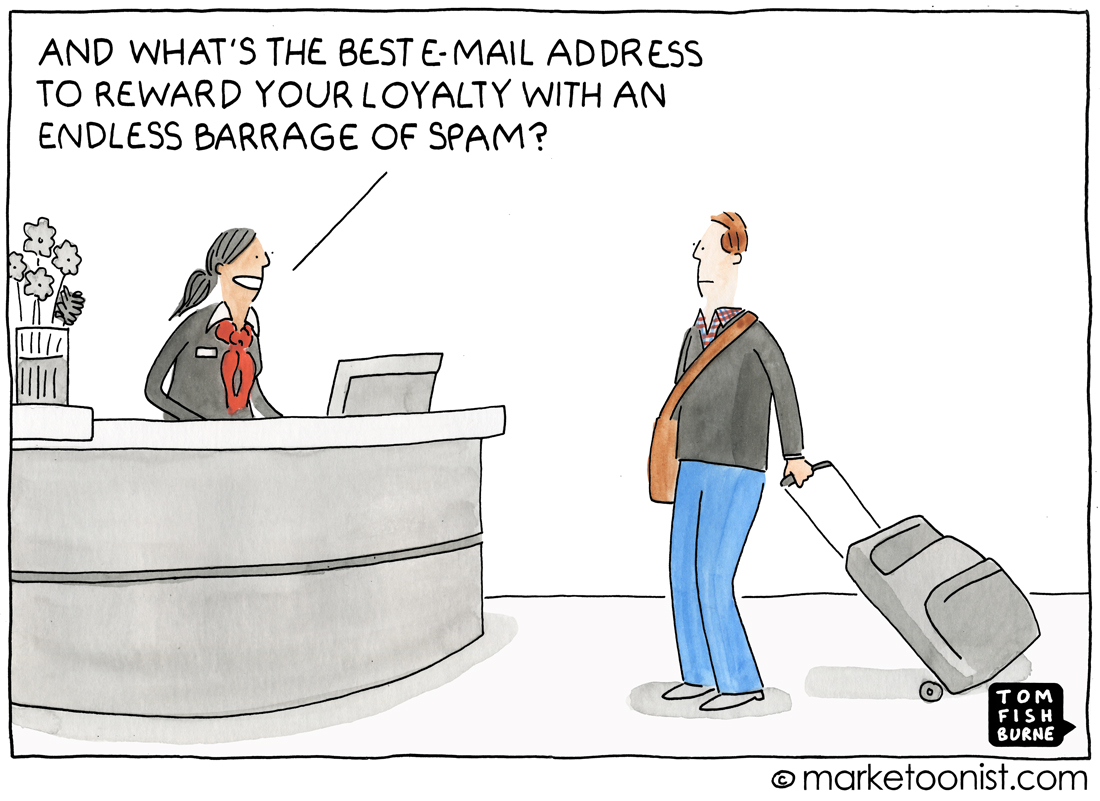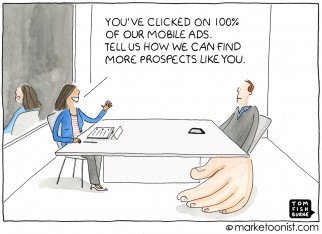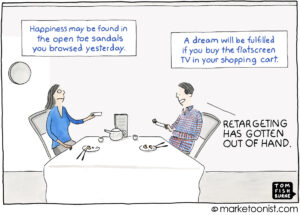Few marketers think that they spam. Spamming is often thought of as using email addresses from a bought list. But spamming is more expansive than that. Spam really just means an unsolicited or unwanted message.
Cory Doctorow recently audited all of the spam in his inbox and discovered that most of it came, not from unknown entities, but from organizations he’d “engaged” with in the past.
“Here’s the surprise: though a small amount of fraud got through my filters, almost all my spam was “legitimate” email. It wasn’t sent by criminals trying to defraud me, but from businesses and causes I’d actually heard of.
“Movietickets.com, Adopt a Classroom, Rstreet Patent and Copyright – from the mundane to the expert, this was the footprint of my life manifest through email, most of it not given explicit permission and none of it wanted…
“Many of these lists were run by companies or organizations I had a relationship with – I’d given a lecture, sent money or bought something – but never agreed to be on their lists. I don’t need updates from a Chicago yoga studio I attended once while on tour in 2005.”
It took Cory 30 days to unsubscribe from the 3,000 “legitimate” email lists his address had been added to.
Marketers frequently take too much license with what it means to have “opted in.” The default assumption seems to be that anyone who provides an email address is “opting in” to constant contact. And yet the result of that assumption alienates the very people those marketers are trying to reach.
Just because a marketer has someone’s email address doesn’t mean they have their permission to email them. Permission has to be earned.
As Seth Godin famously wrote, “Permission marketing is the privilege (not the right) of delivering anticipated, personal and relevant messages to people who actually want to get them.”
I think everything else is a form of spam.
I’d love to hear your thoughts.



Anh Nguyen says
Tom,
You’ve raised a very good point here. I can love a company and their products, but it turns me down a lot once they start sending me a load of promotional emails that screams “pay attention to me!”. Which I’d invariable unsubscribe from, and yes, less likely to engage with their brand when possible.
Your post makes me think of a post by Pamela from CopyBlogger http://www.copyblogger.com/gentler-marketing/ about how to apply a more gentle marketing strategy.
Thanks for sharing!
Cheers,
Anh
Geoff says
It appears to be a symptom of “our product/service is the most important thing in your life” thinking. The assumption that, because I used your product or service, now you can reach out to me any time you want borders on arrogance. It says the may have a misplaced sense of how important they are to their customers.
I almost never give out my e-mail. If I have to for something on-line, I have an account set up just for that sort of thing. I check it once a month and basically just ditch everything I get. Only the most special vendors get my “real” email, because I don’t mind engaging with them, and I trust they aren’t going to bombard me with junk I don’t want to see.
Ryan says
I work for a company that seems to think it’s amazing. Yes, it’s supposedly impressive software, but the company doesn’t seem to have a clue about marketing or offering value to its customers. I think it’d be interesting if companies started behaving more like media companies, with episodic releases that entertained and helped, and gently provided a means to know more/buy every once in a while, much like how many online marketers treat their initial opt-in 3-video series process. It’s all changing quickly, and as Seth Godin says in Tribes, the Internet is not supposed to be direct mail but without the postage stamp cost.
Allen Roberts says
I recently did a similar audit, and while nowhere near the scale of Cory’s story, the results were the same.
My digital musings have extended over 1400 posts over a good number of years, and to find the fodder to kick start the grey matter, I read and speak very widely.
This had resulted in an inbox stuffed with ‘semi-spam’ every day, so I cleaned it out a few weeks ago. Funny though, the ‘unsubscribe’ button is not always working? Must be a glitch in the system.
Tom M. says
The latest e-mail harvesting trick is to ask the customer at the register, “Would you like your receipt e-mailed to you or would you like a paper receipt?” I’m not falling for that one.
Scott says
As someone who runs two information/digital download websites, I struggle with this daily: How to get those valuable emails from people who do want to hear from you (you hope) without crossing too far over the line.
I do use pop-ups because if I don’t, NO ONE sees the “sign up for more info” options. But I use scroll triggered so they will have read half the article. And I use double opt-in.
On one site, I email once every two weeks, and only once a month do I promote a seasonal product. On the other site, only when I publish, which is also maybe twice a month.
Anyway, I’m wondering what you think of a “lead magnet” for getting an email address, vs. just saying “sign up if you want to hear from me.” Lead magnets can sometimes be quite effective if you choose precisely the right thing. But… it’s still kind of coercion.
Everyone is just trying to be noticed online, but it’s all getting out of hand.
Ryan Anderson says
Hi Scott. I’m still relatively new to the world of online business and marketing; but it seems pretty clear to me that Lead Magnets are the way to go. I mean, if you want someone to sign up, what’s better for them? Getting your help/advice (lead magnet) or not? People are generally so passive that we read stuff and move on. If we read something amazing, we *might* subscribe if it’s quick to see where the form is. But if a pop-up offers a nice freebie, it seems like the thing to do for better results. We just ignore the stuff that doesn’t interest us, or sign up based on stuff we like. And, of course, we unsubscribe if it’s all too much or no longer interesting. 🙂
David Sealey says
I think there’s an important point here about allowing customers to use the first email to declare a channel interest. Perhaps your content is better as a Facebook news feed item rather than a solous email campaign.
Ethnographic research on customer’s email preferences and usage patterns could really help with this.